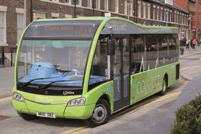
GNE says its alternative charter will eliminate “unnecessary bureaucracy”
Go North East (GNE) has launched a campaign in response to Nexus and Tyne and Wear Integrated Transport Authority’s proposals to introduce a Quality Contract Scheme (QCS) to the area.
The operator’s Charter for Positive Change presents “a real alternative to the ITA’s proposals”. It is encouraging customers and other stakeholders to offer feedback to help build on the charter.
GNE commercial director Martin Harris, said: “We’re not against change; we thrive on it, but not in the form of these so-called quality contracts. They’re unnecessary, uneconomic and ineffective, and they’re just not right for Tyne and Wear.
“The reality is, it is bad news for passengers. It won’t do anything to improve reliability. It will eliminate competition around fares and it will remove passenger choice.
“We think there’s a better alternative – we want a working partnership with Nexus and the Integrated Transport Authority but it’s vital we work together if we are going to serve the best interests of the passengers.”
GNE claims its alternative charter will eliminate “unnecessary bureaucracy”. The charter’s main aims are to protect customer choice, keep fares competitive, protect jobs and ensure the best interests of passengers are protected. The charter also includes sections on “positive change” for business and local authorities, and how it will be delivered.
Bernard Garner, director general of Nexus, said some bus services were “not good enough” under the present system. He claimed only seven out of 10 people are satisfied with their bus services and want to see a more publicly-accountable body running the local bus network.
Speaking to CBW, Martin said: “Nexus has issued to the operators a list of 98 demands, actions and principles they want to be adopted. They range from impossible to doable.”
He added: “There’s no dialogue from Nexus about what is wrong. Satisfied customers are not being listened to. We’re a local firm, which has been around for a hundred years, and we employ 2,000 local people. The QCS will not only put their terms and conditions at risk but also their pensions, and ultimately their jobs.
“Saying ‘yes’ to the charter means saying ‘yes’ to affordable improvements in services, a new, more transparent approach to involvement in decisions about bus services, the simplicity of customerdriven services and the value which healthy competition brings.
“It also means saying ‘no’ to costly and unnecessary increases in bureaucratic control at a time when public funds are stretched to the limit.”
Speaking of the current economic climate, Martin concluded: “This is a call for Nexus and the ITA to work with the operators. If ever there was a time when the public and private sectors should work together it is now.”
If the QCS is approved, it could be two years before it is introduced, following a formal consultation.
Visit the dedicated website at www.sayyesnow.co.uk


